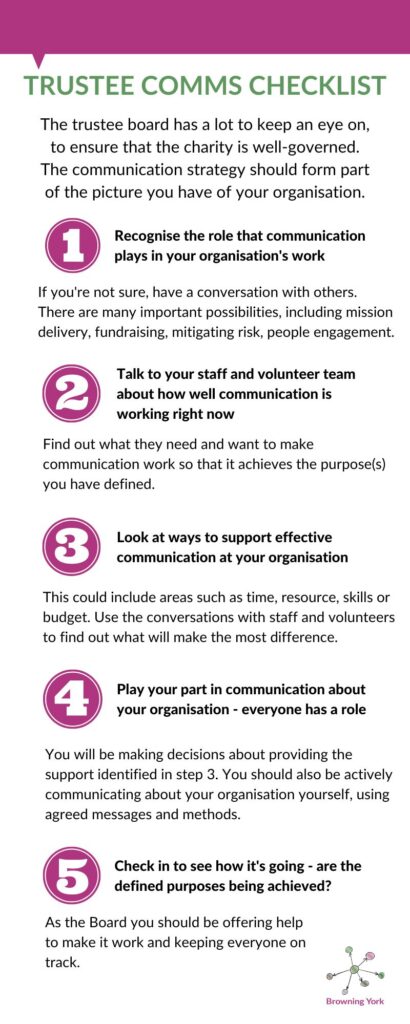Trustees’ Week 2022 takes place 7-11 November. Apparently there are around 700,000 volunteer trustees in England and Wales, so it’s a large group of people and they have considerable responsibility.
As trustees they have a lot of different things to keep an eye on. This is particularly true during difficult times. Many Boards are currently dealing with challenges in their own organisations, across the sector and, most importantly, for the very communities they serve.
The importance of communication
I’ve noticed in the recent years that trustees seem to be more involved in my clients’ requests for communication help. This Board-level interest increased particularly since the start of the Covid pandemic. Those that ask for support realise that keeping all audiences informed and engaged is important to their success. Often the need to improve communication is often tied to an organisational strategy review.
So I put together a communications checklist specifically for Boards, to help them identify what they need to do.

Trustees’ interest in comms
Trustees’ Week is a chance to showcase the great work that they do to run our charities. If yours are supportive with your communication activity, why not think about how to recognise that support?
If your Board has not yet discovered the importance of comms, you might like to read the guest blog I published about how to get your trustees interested in communication.
How does the link between trustees and communication work at your organisation? I would love to hear your stories.
If you or your Board need help to review how communication can contribute to your overall success, please get in touch to see how I can support you.
Until next time
Sarah
Wording of the infographic
Trustee comms checklist
The trustee board has a lot to keep an eye on, to ensure that the charity is well-governed. The communication strategy should form part of the picture you have of your organisation.
1. Recognise the role that communication plays in your organisation’s work
If you’re not sure, have a conversation with others. There are many important possibilities, including mission delivery, fundraising, mitigating risk, people engagement.
2. Talk to your staff and volunteer team about how well communication is working right now
Find out what they need and want to make communication work so that it achieves the purpose(s) you have defined.
3. Look at ways to support effective communication at your organisation
This could include areas such as time, resource, skills or budget. Use the conversations with staff and volunteers to find out what will make the most difference.
4. Play your part in communication about your organisation – everyone has a role
You will be making decisions about providing the support identified in step 3. You should also be actively communicating about your organisation, using agreed messages and methods.
5. Check in to see how it’s going – are the defined purposes being achieved?
As the Board you should be offering help to make it work and keeping everyone on track.

